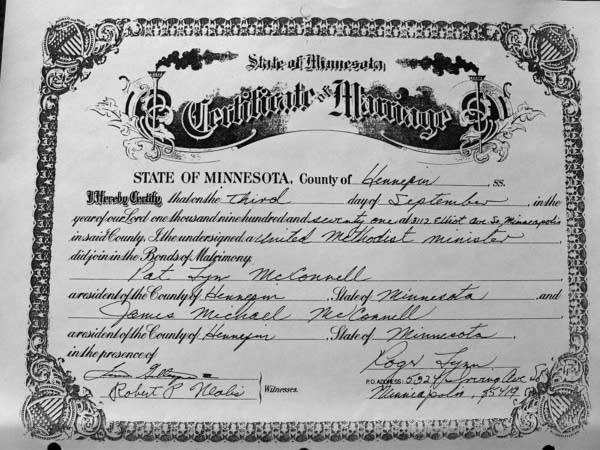For some Minnesota Methodists, a same-sex marriage conundrum on Aug. 1

Minnesota's new marriage law goes into effect Aug. 1, creating new urgency for many faith communities about whether they will perform such weddings, particularly those that have been wrestling with how to address sexual orientation for decades.
Among those torn over the issue are Methodists, who have a unique history on the matter in Minnesota -- as retired pastor Roger Lynn would surely testify.
On Sept. 3, 1971, Lynn performed a wedding that would define his career as a United Methodist minister. In a large Victorian home in south Minneapolis, he married two men: Jack Baker and Mike McConnell.
Lynn was a last-minute fill-in as officiant after another Methodist minister backed out. But Lynn believed it was the right thing to do.
Create a More Connected Minnesota
MPR News is your trusted resource for the news you need. With your support, MPR News brings accessible, courageous journalism and authentic conversation to everyone - free of paywalls and barriers. Your gift makes a difference.
"The Methodist Church at that time had no rules against marrying two men or two women for that matter," Lynn said. "There wasn't anything said for it or against it."
MORE ON SAME-SEX MARRIAGE IN MINNESOTA
• Details: The Minnesota same-sex marriage bill
• Survey: Where will the wedding bells ring?
• Video: Jack Baker and Michael McConnell predicted victory in 1970s
• Interactive: Deep roots of the marriage debate
• Special report: How the marriage amendment was defeated
• Profile: The general behind Minnesota's same-sex marriage law
• Maps: Same-sex marriage votes compared
Lynn still vividly recalls the moment he pronounced Baker and McConnell husband and husband.
"They kissed each other, and it was a very passionate kiss," he said. "And it was just this strong sense of my own, like, 'This is very different.'"
It was different, and the national press and the international governing body of the United Methodist Church took notice.
A year after the wedding, the General Conference of the United Methodist Church passed a resolution defining marriage as only the union of a man and a woman. It also prohibited United Methodist clergy from conducting same-sex marriages or using church property to do so.

Much to Lynn's dismay, the rule still stands. He had always hoped to perform more weddings for same-sex couples. But church law, not state law, stands in his way.
"I'm not going to say publicly that I'm going to do a gay marriage," Lynn said. "There could be a trial and I could lose my pension which, you know, I'd rather not do, but I would risk that. But there's no sense, thumbing my nose."
Christa Meland, director of communications for the Minnesota Annual Conference of the United Methodist Church, said the policy on marriage applies to congregations worldwide. She said Methodists at the state level do not have the authority to permit clergy to perform same-sex marriages.
"The United Methodist Church, like the nation as a whole, is divided over same-sex marriage," Meland said. "There are a wide range of views within the Minnesota conference, and we recognize that people of good faith will disagree about the church's position on certain matters."
In 2012, Minnesota's Methodist leaders voted 400 to 169 to oppose a constitutional amendment that would have limited marriage only to a man and a woman, a prohibition that at the time was already in state law. A majority of pastors and lay leaders thought the amendment conflicted with the Methodist principle that "all persons, regardless of age, gender, marital status, or sexual orientation, are entitled to have their human and civil rights ensured."
As to whether pastors in Minnesota's 360 United Methodist churches will be able to perform same-sex marriages now that doing so is legal in the state, that can only be changed by the international body, which next meets in Portland, Ore., in 2016.

One activist who will be there lobbying for full inclusion of same-sex couples is Walter Lockhart, pastor of Walker Community United Methodist Church in south Minneapolis, a church Roger Lynn once led.
"Twenty-one years into my career, I am impatient at the pace of change and the pace that we are moving towards justice," Lockhart said.
The pace is deliberative because when the General Conference makes a move, it applies to United Methodist churches across the world. A substantial number of Methodists in the South and in Africa strongly oppose same-sex marriage.
That official policy doesn't eliminate the dilemma for Methodists in Minnesota. Lockhart said 50 United Methodist ministers and lay people met recently in Richfield, Minn., to discuss how they will handle requests from gay and lesbian couples who wish to marry.
Lockhart is considering religious disobedience. "For me, the most important piece is to be pastoral and to meet the needs of the couple," he said. "And if that crosses over the line of United Methodism, I am prepared to deal with United Methodism as I may or may not have to cross over the line."
Clergy from many religions will navigate those lines on Aug. 1. Some faith communities, like ELCA Lutherans, allow individual congregations to make the decision. Other religions have policies set at the national or international level, so a change in Minnesota's marriage law has little effect.
• Related: Where will the wedding bells ring?
